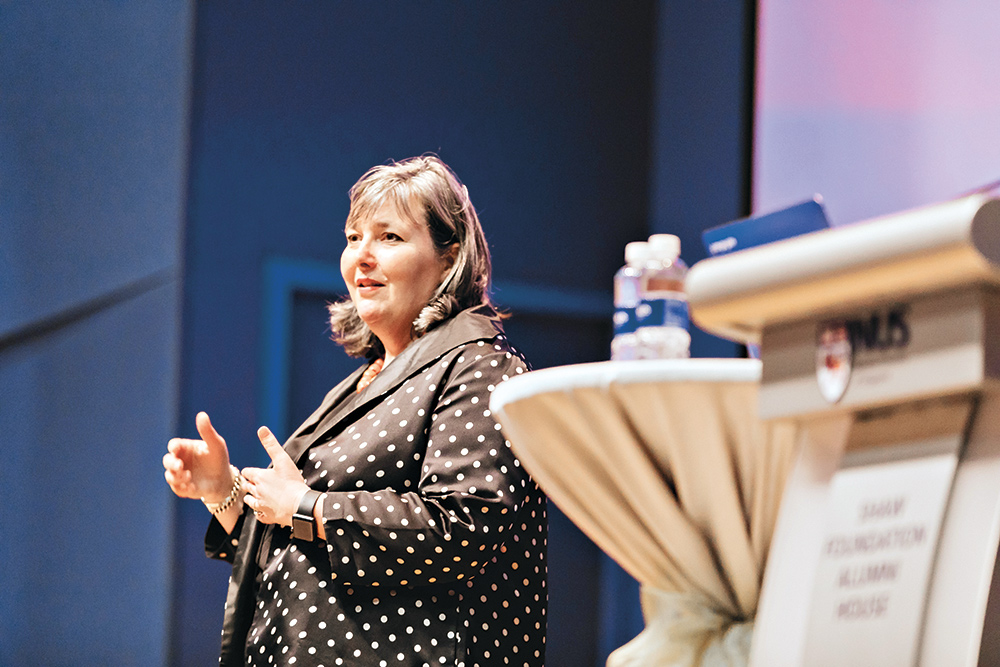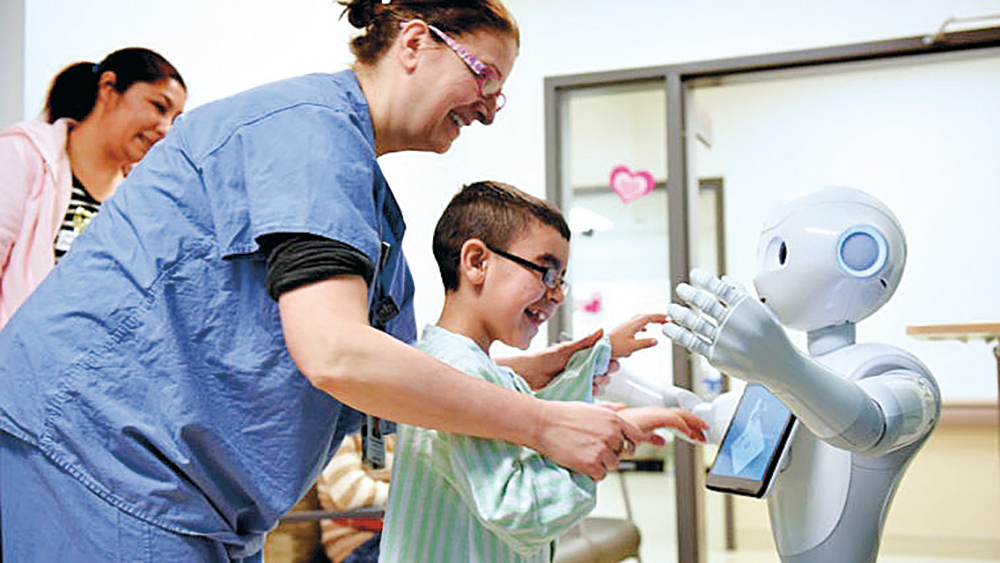For The Love Of Robots
Veteran enterprise technology adoption expert Ms Janneke Ritchie invited Singapore to consider the possibilities of living and working with smart machines.

“Robots are not for everyone…” — These are not the words you expect to hear at a talk called For the Love of RobotsTM, much less see flashing on a presentation slide the disquieting image of a Terminator-like machine, which evokes a dystopian future where smart computers take over the world. Once she got the audience’s attention however, speaker Ms Janneke Ritchie — who has more than 20 years of experience in enterprise technology adoption — proceeded to dispel such fears and commonplace myths and also tackle the approaching reality of robots as co-workers.
Organised by NUS Alumni Relations as part of its Tech Talk series — in partnership with the High Commission of Canada in Singapore — Ms Ritchie’s address on 20 February at Shaw Foundation Alumni House was certainly well-timed. After all, robots and artificial intelligence (AI) have been making the news fairly regularly, often reflecting our collective unease about both; Ms Ritchie’s Terminator reference addressed this elephant in the room, and then moved right along.
A Helping Hand at Home
As a professional with a passion for robots, Ms Ritchie believes these machines will support and augment the work of human beings, along with mostly doing the sort of labour that humans do not want to do or are ill-suited to doing. Ms Ritchie revealed in a slide the number of countries and cities where robots have joined the workforce and are interacting with people. Besides the sheer number of robots at work currently, what was perhaps even more impressive about the findings highlighted in the slide is the fact that none of these are in heavy industry. So, where can we find these robot workers then? One specific area that Ms Ritchie zoomed in on was eldercare, and how robots might be usefully deployed in supporting roles. The example she used was that of Japan, where the humanoid robot Pepper famously leads senior citizens in exercise programmes. The Japanese government, which is dealing with a problem of managing an ageing population, is going even further, according to the Reuters report cited by Ms Ritchie. Authorities in Tokyo have financed the development of eldercare robots to help fill a projected shortfall of 380,000 specialised workers by 2025 — a scenario that might take place here in Singapore as well.
Coming Soon Everywhere
In Ms Ritchie’s view, relationships are key to creating fruitful work environments where humans and robots interact — and appearances count in this respect. She used examples of robots that had to interact with people in a service environment, or in the home, which were often designed with a bent towards cuteness so as to appear non-threatening and more familiar.
Ms Ritchie’s company, Orange Gate Consulting, looks at this emerging phenomenon because she says it is now the “deployment phase for robots in the wild.” Citing an estimate by the International Federation of Robotics in 2018, Ms Ritchie stated that 39.5 million household robots will enter the workforce between then and 2021. Companies like Orange Gate are tracking how and where these robots pop up, and its website even features a robot-spotting blog, that highlights robot co-workers — in different work environments — that are significant for their originality, impact and business value.
 Pepper, the friendly humanoid robot, represents the way forward in using robotics to address manpower needs in the service sector.
Pepper, the friendly humanoid robot, represents the way forward in using robotics to address manpower needs in the service sector.
Ms Ritchie is convinced that robots are today approximately at the same stage mobile phones were between the debut of Motorola’s Razr in 2004 and when Blackberry burst upon the scene a year later. Just as these devices paved the way for our current reality, where every human being is likely to have a personal computer on hand at all times, Ms Ritchie thinks we are just 12 to 15 years away from the prospect of robots being a fixture of our everyday lives. She advised that we should be prepared.
As far as challenges in the world of robotics are concerned, Ms Ritchie acknowledged that security remains a major concern – but one that will continue to be improved upon, and ultimately solved, in the near future. Of course, the issue has to do with hacking, which one cannot escape if robots are connected to the Internet, via IoT for example. Ms Ritchie estimated that the security question might not have a firm answer till at least 2025.
In the question-and-answer session that followed the talk, Ms Ritchie further addressed queries from the audience on what jobs might be lost to robots as well as the pace of AI development. She emphasised that her main area of interest is in proper robots, not necessarily automation, and how these machines will interface with human beings in real life. In other words, Ms Ritchie is interested in what happens when we have “cobots” as well as co-workers, because robots will be working with us. On the AI front, Ms Ritchie clarified that despite what we might encounter in Hollywood-produced shows, no one is anywhere near creating anything like general AI or self-aware machines.
The Tech Talk series sees experienced industry experts speaking on emerging technological trends. There will be four Tech Talks a year.
UPCOMING EVENT
How Conversational AI Transforms The Way We Work
Tech Talk
22 May, 7.30pm
Register at alumnet.events/TSmay19